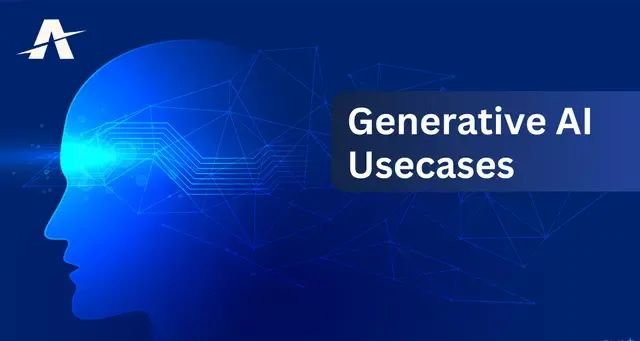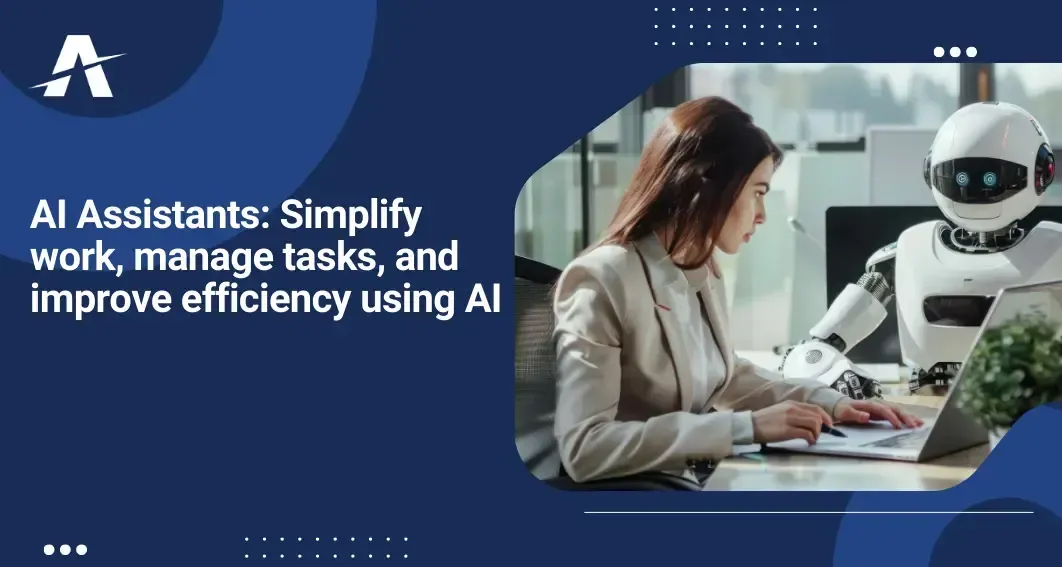
Artificial Intelligence (AI) is no longer just a trendy word. It’s now a big part of our everyday lives. One of the most useful and popular forms of AI is the AI assistant. These smart tools are designed to make life easier by handling tasks like managing emails, scheduling meetings, setting reminders, and even automating repetitive work.
Whether for professionals, businesses, or personal use, AI assistants are helping people save time, stay organized, and work more efficiently. In this blog, we’ll look at how AI assistants simplify daily work, help manage tasks better, and improve overall productivity in both professional and personal life.
What is an AI Assistant
An AI assistant is a software tool powered by artificial intelligence designed to perform tasks, answer questions, and provide support in managing workflows. They can understand natural language, learn from user behavior, and integrate with various applications to streamline operations. Popular AI assistants like Siri, Google Assistant, Alexa, and enterprise-focused tools such as ChatGPT, Microsoft Copilot, and Slack bots demonstrate how widely they are used across different industries.
Simplifying Work with AI Assistants
One of the biggest advantages of AI assistants is their ability to simplify complex tasks. Professionals often juggle multiple responsibilities, and manual coordination can be overwhelming. AI assistants ease this burden by providing smart recommendations, reminders, and even predictive insights.
For example, in a corporate environment, AI assistants can prepare meeting summaries, highlight key action points, and schedule follow-ups without manual intervention. In personal use, they can handle grocery lists, provide reminders for bill payments, and suggest travel routes based on traffic.
This simplification of work allows users to focus on strategic and creative aspects rather than getting stuck in repetitive administrative duties.
Managing Tasks Effectively with AI
Task management is another area where AI assistants shine. Traditional task management relies on manual entries, sticky notes, or to-do lists. While these methods work, they lack adaptability and intelligence. AI-powered task managers, however, go a step further.
AI assistants can:
Prioritize tasks based on deadlines and importance.
Send automated reminders and notifications.
Integrate with calendars, email, and project management tools.
Allocate resources and suggest optimal timelines.
Track progress and provide productivity insights.
For businesses, this means smoother workflows and better time management. For individuals, it means improved organization and reduced stress from missed deadlines. AI assistants act like personal project managers who ensure nothing slips through the cracks.
Improving Efficiency with AI
Efficiency is all about achieving more in less time, and AI assistants are built with this principle in mind. By reducing the time spent on repetitive or low-value tasks, they free up valuable hours for high-impact activities.
Some ways AI assistants improve efficiency include:
Automating email responses and sorting messages.
Generating quick reports from data.
Offering voice-activated commands for multitasking.
Assisting with research and summarizing information.
Providing predictive analytics to make informed decisions.
For example, in customer service, AI chatbots can handle routine queries instantly, reducing the workload on human staff. In healthcare, AI assistants can help schedule patient appointments and manage records, allowing doctors to spend more time with patients. Efficiency gains like these have far-reaching benefits across industries.
AI Assistants in the Workplace
In the modern workplace, AI assistants are no longer optional but essential. They act as virtual teammates who take care of background processes while humans focus on creativity and problem-solving.
Common workplace applications include:
Scheduling meetings and avoiding conflicts in calendars.
Creating reports and presentations based on raw data.
Assisting HR with employee queries and onboarding.
Supporting sales teams with customer insights and follow-ups.
Helping managers track project milestones and team productivity.
AI assistants also adapt to an organization’s specific needs. For example, finance teams can use them for invoice management, while marketing teams can leverage them for social media scheduling and content planning. This versatility makes them a universal asset.
AI Assistants for Personal Productivity
Outside of the workplace, AI assistants are equally valuable for personal productivity. They can serve as daily planners, fitness trackers, and even learning companions. Whether you are a student preparing for exams, a freelancer managing multiple clients, or a parent balancing household responsibilities, AI assistants can make life more manageable.
Some personal productivity uses include:
Setting alarms and reminders.
Managing shopping lists and budgets.
Tracking health and fitness goals.
Providing real-time language translation.
Offering educational support such as answering questions or summarizing study materials.
By integrating into smartphones, smart speakers, and wearable devices, AI assistants ensure accessibility anytime and anywhere.
The future of AI assistants is promising, with advancements in natural language processing, machine learning, and predictive analytics making them smarter and more intuitive. Future AI assistants will likely offer even deeper personalization, seamlessly anticipating user needs without explicit instructions.
They may also play a bigger role in decision-making, offering advanced insights based on large datasets. For instance, businesses could rely on AI assistants for market analysis, while individuals might use them to receive personalized career or financial advice.
As AI continues to evolve, assistants will become less of a tool and more of a true partner in both professional and personal life.
Benefits of Using AI Assistants
To summarize, the key benefits of using AI assistants include:
Time savings through automation.
Improved task management and prioritization.
Enhanced workplace productivity.
Reduced errors in repetitive tasks.
Greater focus on creativity and strategy.
Accessibility across devices and platforms.
AI assistants have moved from being convenient digital helpers to becoming powerful productivity partners. They simplify work by handling repetitive tasks, manage schedules and responsibilities effectively, and significantly improve efficiency across both professional and personal domains.
As organizations and individuals continue to embrace digital transformation, the role of AI assistants will expand even further. Adopting these tools today means staying ahead of the curve tomorrow, ensuring you remain productive, organized, and efficient in an increasingly fast-paced world.
Frequently Asked Questions
1. What is the main purpose of an AI assistant?
The main purpose of an AI assistant is to simplify work and improve efficiency by automating tasks, managing schedules, and providing intelligent support for decision-making.
2. Can AI assistants replace human workers?
AI assistants are designed to complement human efforts rather than replace them. They handle repetitive and time-consuming tasks, allowing humans to focus on creative and strategic work.
3. Are AI assistants safe to use?
Yes, AI assistants are generally safe to use, but it is important to manage privacy settings and ensure data is handled securely, especially when dealing with sensitive information.
4. Which industries benefit most from AI assistants?
Almost every industry can benefit, but some key sectors include healthcare, finance, education, customer service, marketing, and IT.
5. Do AI assistants learn over time?
Yes, many AI assistants use machine learning to adapt to user preferences and improve performance over time, making their support more personalized and effective.
6. Can AI assistants work offline?
Some AI assistants offer limited offline functionality, but most require an internet connection to access cloud-based services and advanced features.












